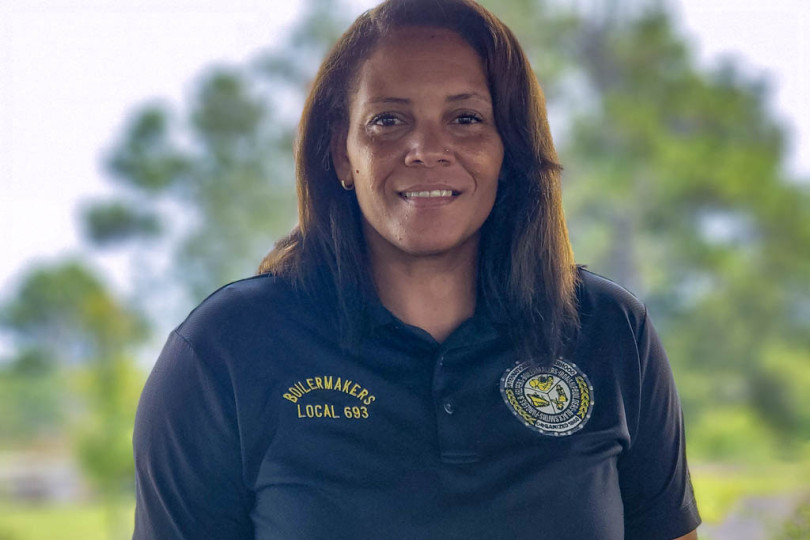I don’t feel like I’m at work at the apprenticeship. I would do it for free if I could afford to.
Eight years ago, when Latasha Dixon was hired on at Huntington Ingalls Shipbuilding and joined Local 693 (Pascagoula, Mississippi), she admits she didn’t know much about unions. She was initially hesitant about participating in union activities. But, when union leadership approached her about getting involved as the apprentice coordinator four years ago, she was intrigued.
Previously, Dixon had worked as an elementary school aide. She felt drawn to teaching and encouraging students. So, assisting apprentices through the apprenticeship program was an opportunity to tap back into what she loves: education. It was also a way to connect her passion for education with her union.
“I don’t feel like I’m at work at the apprenticeship. I would do it for free if I could afford to,” she said. “I want to encourage them [apprentices] in some kind of way. Working with the union helps me get back to my teaching passion.”
Dixon’s career path has positioned her perfectly for her role. After an eight-year stint in the army reserves, she was hired as a helper at the shipyard. She came in with no experience, but her keen observation skills helped her catch on quickly. Looking back, she says she wishes she had gone through the apprenticeship herself. Her role as apprenticeship coordinator allows her to provide that support to the apprentices.
Dixon is a part of an apprentices’ educational journey from start to finish: the interviews and selection process, orientation and assistance through their 18-month to two-year program. Recently, the company reconstructed the program. Dixon, with the help of Local 693 President Martina Taite, played a fundamental role in creating an effective company standard. It wasn’t always easy to motivate the company towards certain ideas, she notes, but they remained resilient in her pursuit to see positive changes made for the apprentices.
“I pushed back,” Dixon says. “The union has the right to help them become journeymen. I had to organize a solid structure to make it work. I had to help develop a standard with the company to get a program that would suffice and create journeymen. I was able to get through [to the company] those valid points.”
Dixon stays busy with her fulltime job, her union positions as apprenticeship coordinator and recording secretary, and being a wife and a mother to her two sons. She also serves on the communications committee at her local United Way and is in the last year of completing her bachelor’s degree at the University of Alabama starting this fall. Yet, Dixon is hungry for more. Her latest endeavor is advocating for women coming into the trade.
“I’ve started to notice how many opportunities there are for advancement now,” she says. “I’m watching the women [who’ve risen in leadership] and what they are doing. I definitely want to be in a position where I can motivate and organize women. They need encouragement.”
Dixon believes there is always a bit more that can be pulled out of any individual, and sometimes it takes the right person or opportunity to motivate that individual to be their best self.
When encouraging women in the trades, she says, “Apprentices who are women need to walk tall and be proud that they’re a Boilermaker,” she says. “It’s not for the weak. You have to have discipline and strength to be in the trades. At all times, walk with your head high, flaunt what you know how to do, show the fact that you’re eager and show them what you’re made of.”
Dixon looks to a fellow Mississippian and hero from the past for inspiration and encouragement.
“There are so many women before us who paved the way for advancement,” she says. “The most iconic for me is Fannie Lou Hamer. She is from Mississippi and helped organize voters rights and registration in 1964. She was an unbreakable leader. If she were here today, I think she would be a Boilermaker!”






